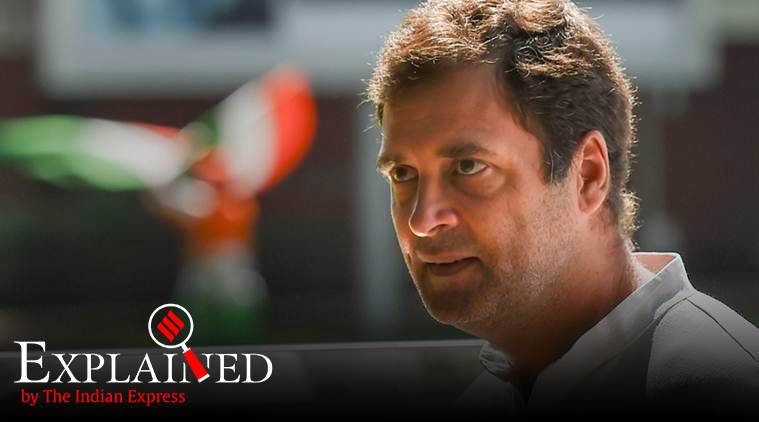Intervening in a debate in Lok Sabha on “the agrarian situation in the country”, Rahul had described the government as “suit-boot ki sarkar", and asked Prime Minister Modi to visit the farmers to see their situation for himself.
Former chief economic adviser Arvind Subramanian has claimed that the cut in corporate tax announced by the government last month was first proposed towards the beginning of the term of the first Narendra Modi government, but the idea was shelved after Congress leader Rahul Gandhi’s “suit-boot ki sarkar” jibe.
Subramanian was CEA from October 2014 to June 2018. What did Rahul say, and when, and why is this discussion relevant?
What is the ‘suit-boot ki sarkar’ jibe?
At the beginning of 2015, Rahul Gandhi, then the Congress vice-president but clearly the person who would inherit the party leadership from his mother Sonia Gandhi, took a nearly two-month-long, much-discussed political sabbatical.
His first big public engagement after his return was a rally organised by his party at Delhi’s Ramlila Maidan on April 19, 2015. Rahul spoke forcefully, attacking Prime Minister Narendra Modi directly, and painting him as a friend of big corporates and an enemy of the poor and farmers.
The Congress leader spoke of farm loan waivers under the UPA government, the MNREGA and food security for the poor, and of his personal intervention to stop people from losing their lands in Niyamgiri in Odisha and Bhatta-Parsaul in western Uttar Pradesh. “Whatever we did was for the weak and the poor,” he had said.
A day later, on April 20, intervening in a debate in Lok Sabha on “the agrarian situation in the country”, Rahul described the government as “suit-boot ki sarkar”, and asked Prime Minister Modi to visit the farmers to see their situation for himself. “The wheat stock is lying in the markets because the government is not taking it… You are kicking the farmers away whenever they are asking for fertilisers,” Rahul had said.
He described the Modi government as “udyogpatiyon ki sarkar”, “bade logon ki sarkar” and “suit-boot ki sarkar” (a government of capitalists, rich people, and of those dressed in suits and boots).
How did the BJP react?
Underlining the contradictions between the rich and the poor has long been a political tactic and slogan in India, used by all political parties. While the socialists, communists and Dalit parties focus their politics on the dispossessed and marginalised, the Congress too has traditionally painted itself as being on the side of the poor. Indira Gandhi had made a sharp leftward turn in the late 1960s as she faced powerful political challenges and an economic crisis. This period saw Indira sharply criticising the United States, and take steps such as the nationalisation of banks and coal.
The BJP has been making efforts at breaking free of its Brahmin-Bania party image, and projecting itself as a party of “all Indians”. The elections results of 2014 showed that large sections of the poor had switched loyalty to the BJP, a trend that was reinforced in the elections of 2019. Even so, the attack by Rahul nudged the BJP into launching a defence of its pro-poor credentials.
The Prime Minister himself lost no time in underlining that all his decisions were intended to benefit the poor. In Parliament, Arun Jaitley, the then Finance Minister, countered that theirs was a soojh-boojh ki sarkar (a sensible and understanding government). In an interview to The Indian Express in the summer of 2015, the then Minister for Parliamentary Affairs and Urban Development M Venkaiah Naidu had said: “His (Rahul’s) allegation that we are friends with corporates is a cheap tactic. What is a ‘suit boot sarkar’? Does he mean to say the poor should not wear suit-boot? There are many rich people who don’t wear suits. I want to tell him: Adani aur Ambani, aapka meherbani. They prospered during your rule. They did not come in the last 10 months. He should know that Modi is the messiah of the poor.”
Source: Read Full Article


